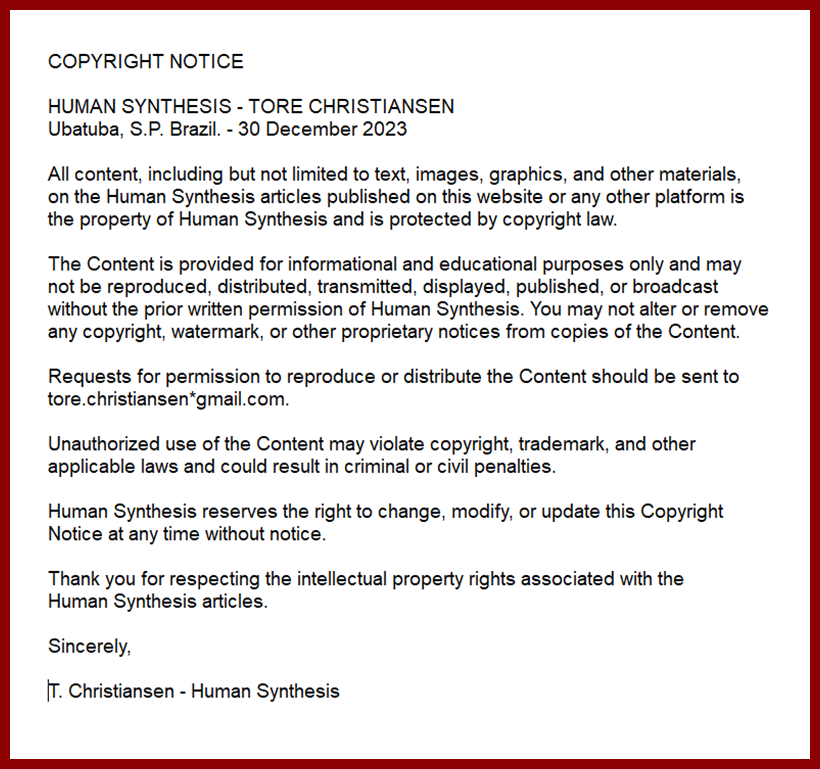Preparations to deliver Patriot missile systems to Ukraine under way, Nato’s top Europe commander says – Europe live
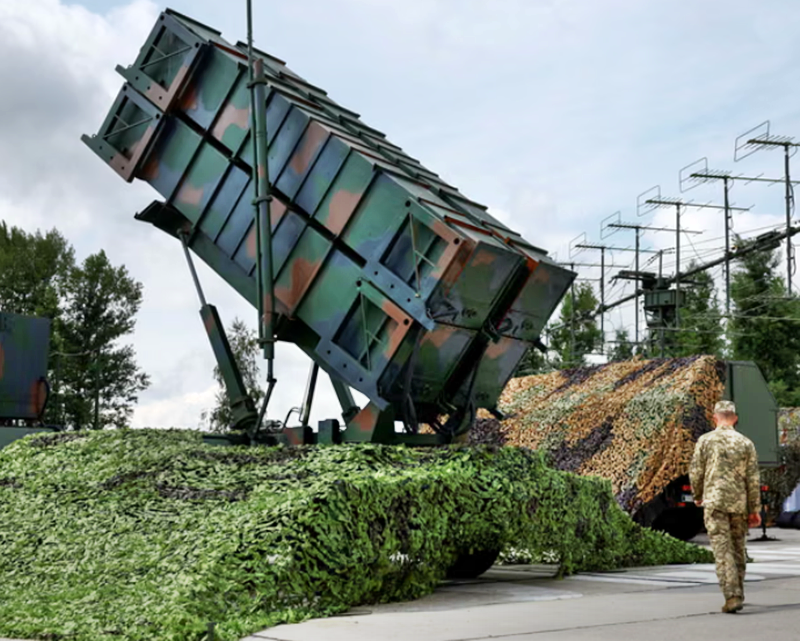
By Guardian - Jakub Krupa/Jennifer Rankin - Thu 17 Jul 2025 16.56 BST
Preparations for deliveries for Ukraine under way, Nato's top Europe commander says, as he warns Russia is and will remain threat.
Jakub Krupa
Preparations are fully under way for delivery of Patriot missile systems to Ukraine, Nato’s most senior commander in Europe confirmed, as he warned that Russia is and will remain a threat to the alliance in Europe even if a peaceful solution to the war in Ukraine is found.
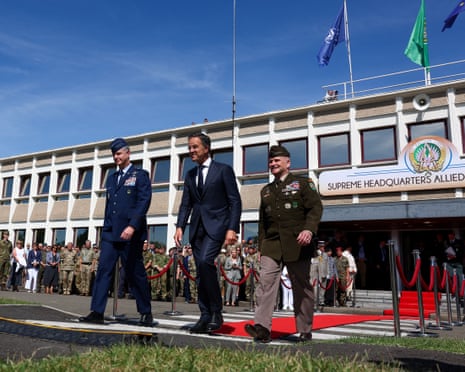
Nato’s Supreme Allied Commande Europe, Gen Alexus Grynkewich, confirmed this morning that the guidance he has been given was to deliver the Patriots to Ukraine as quickly as possible, making good on US president Trump’s announcement earlier this week.
“I’m not going to reveal to the Russians or anyone else the exact numbers of weapons that we’re transferring or when those will happen, but what I will say is that preparations are under way.
We’re working very closely with the Germans on the Patriot transfer, and the guidance that I’ve been given has been to move out as quickly as possible.
So we’re doing that. And then we’re also looking at other capabilities and what those needs are, and working on proposals for our political leadership.”
He added:
We’re going to move as quickly as we can on this.
He said that Patriot systems already in Europe can be quickly moved to Ukraine, and later backfilled from the production line in the US.
“Air defence is important on the modern battlefield, and we’ve seen the scale of recent Russian attacks against Ukraine, so it is a key focus area,” he said.
Grynkewich, a former fighter pilot who took the most senior allied post in Europe post earlier this month, also warned that even if there is a peaceful solution in Ukraine, Russia will remain a threat.
“War persists on our doorstep in Ukraine.
While we seek a peaceful resolution, even if that resolution comes, the Russian capabilities that are there will reconstitute and just by their very existence will be something that we’ll have to think of from the military perspective, and understand how it threatens the Alliance and the freedoms that we hold dear.
Russia will undoubtedly, in my mind, remain an enduring threat.”
Grynkewich also stressed the urgency of Nato stepping up more broadly, as he warned about the prospect of multiple conflicts happening at the same time, including a war in Europe and a war in the Pacific.
“Those of you who listen to our great secretary general, Mark Rutte, have heard him say that the thing [China’s] Xi is probably going to do before he decides to go across the Taiwan Strait is give his friend Putin a call and ask him to help.
That, to me, means that both of these things could happen together, but we’re going to need every bit of kit and equipment and munitions that we can in order to meet that.
And we’ve all heard the year 2027, that’s just two years away, when we think that Xi could be ready to make his move, and that phone call to Putin might come.
So time is of the essence.”
I will bring you all key updates from across Europe today.
It’s Thursday, 17 July 2025, it’s Jakub Krupa here, and this is Europe Live.
Good morning.
16.56 BST
One final thing to add on the Starmer/Merz talks in London is that they committed to looking at the feasibility of starting a direct train service between London and Berlin.
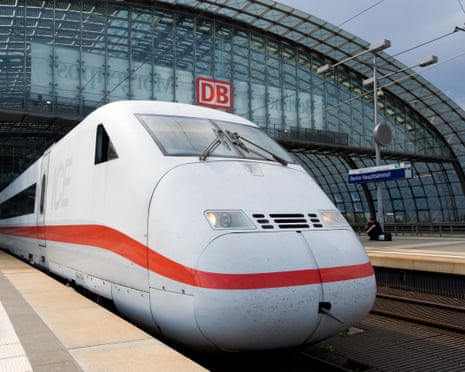
Our transport correspondent Gwyn Topham noted:
While direct trains to new European countries may be at least a decade away, the international train operator Eurostar has spoken of its ambition to open new routes to Frankfurt and Geneva. Other potential rival operators, including Virgin, are hoping to start cross-Channel services.
Opening new routes has been difficult due to commercial viability, different track and train systems, and border requirements and station capacity.
Eurostar’s longest direct route to date, London to Amsterdam, has had to overcome numerous difficulties, largely linked to border security and passport control, since its delayed inception in 2018.
The demand for direct London-Berlin trains is unclear. Passengers can travel between the UK and German capitals in about 10 hours, changing in Brussels and Cologne.
London-Berlin trains on the drawing board for UK-German rail taskforceRead more
(For what it’s worth, I’d love that train connection, so yes, please!)
Merz says he 'deplores' Britain's decision to leave EU - snap analysis
Jakub Krupa
As my colleague Andrew Sparrow rightly notes over on the UK blog, Merz also chose to go a bit further than perhaps usual diplomatic niceties allow, saying in his opening remarks he “deplored it deeply” that the UK decided to leave the European Union.
It’s interesting – if not entirely surprising, obviously – to hear him say it so bluntly while standing alongside the UK prime minister.
He’s not the first one though: the French president, Emmanuel Macron, directly and repeatedly criticised Brexit in his remarks during his recent state visit in the UK, too.
16.38 BST
Starmer confirms western peacekeeping force in Ukraine includes land element
Closing the press conference, Starmer goes back to Ukraine and says the focus is on getting Russia’s Putin to the table to agree to an unconditional ceasefire.
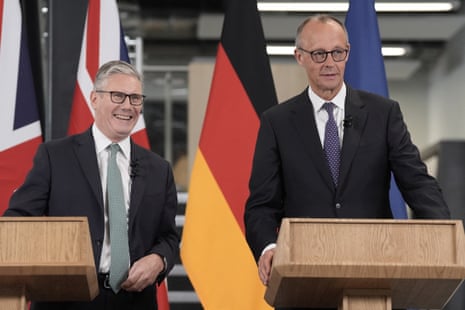
“We have been talking for some time about peace through strength, and that is why we must provide Ukraine with the capability it needs to be in the strongest possible position,” he says.
Asked specifically about presence on the ground, he confirms that the peacekeeping force proposed by the so-called Coalition of the Willing, designed by military planners from participating countries, includes “plans for the air, for the sea, and yes, for land.”
“Most importantly, and often the most difficult, we’ve got a command structure in place so that the plans can move from the plan stage to being operationalized very quickly,” he says.
And that concludes the press conference.
16.36 BST
Germany's Merz rules out support for new EU taxes on companies to fund bloc's budget
Merz also gets asked about the EU budget and makes it very clear that he’s not really a big fan and has lots of questions to ask of the European Commission.
He says the budget appears to be rightly changing the weighting of different elements, dedicating more funds to urgent issues like defence and security, and he welcomes that change, but points out to questions about its funding.
He says we cannot accept new taxes on companies that would be imposed directly by the EU and says he doesn’t think there is a legal basis for that measure.
“As far as Germany is concerned, I can exclude Germany pursuing such an approach,” he says, adding that it’s necessary to reduce, not increase burden on European companies.
“Our aim is not to increase the burden on companies in order to create leeway for the European Union. That is not acceptable,” he says.
16.23 BST
Merz also reveals that the question of deliveries to Ukraine would be “not a matter of hours, but perhaps a question of days or weeks” as details on supplying and transporting these systems are still being worked out.
He declines to say what other countries are involved in the scheme.
Starmer reminds that Russia is now facing the 50-day countdown as part of Trump’s demand to end the war, and says this “has to be coupled with economic pressure.”
“President Zelensky has shown, months ago now, his willingness to come to the table in pursuit of lasting peace. It’s now for Putin to come to the table,” he adds.
16.15 BST
Starmer, Merz hail importance of Ukraine deliveries deal with Trump
British prime minister Keir Starmer and German chancellor Friedrich Merz are now speaking to the press after today’s bilateral talks in London and signing a new cooperation treaty between the two countries.
You can follow the conference live including domestic UK lines and on joint efforts to tackle irregular migration on our UK live blog here:
Merz says he ‘deplores deeply’ UK’s decision to leave EU after signing UK-Germany treaty – UK politics liveRead more
But from the European perspective, it’s worth noting Merz’s comments on Ukraine and Donald Trump.
The German chancellor praised Trump’s “very important initiative” to send Patriot systems to Ukraine, and he said “we have to discuss the details with our partners are quickly as possible” to move and put further pressure on Russia’s Vladimir Putin.
But he also added that European countries “need to have clarity as to how the US will replace the weapon systems that the Europeans will transfer to Ukraine.”
He stressed:
“Europe and the United States, that is clear, are pulling in the same direction here.”
In his comments, Starmer said it “shows the strength of Germany, France, and the UK working so closely with other allies in Europe, but also working with the US” that Trump moved to a position where “he has made it absolutely clear that he wants Putin to move.”
Merz separately said that Ukraine will be “much better positioned” to continue to fight Russia’s aggression as a result of the new deliveries.
15.24 BST
Farmers, environment emerge as losers from new EU budget
Jennifer Rankin in Brussels
The dust is settling on the proposed EU mega budget, outlined by the European Commission president, Ursula von der Leyen, on Wednesday. And the big losers seem to be Europe’s farmers and European nature.
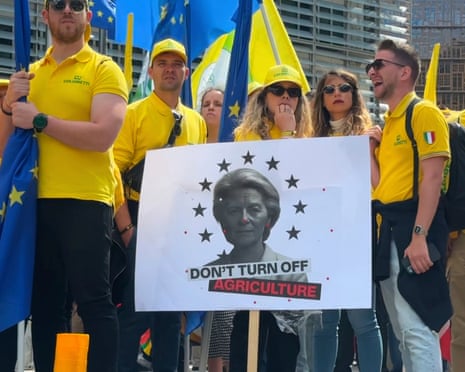
Under the plans, European farmers would see agricultural payments cut to €295bn over the 2028-24 cycle, compared with €387bn in the current budget.
Green MEPs and campaigners have criticised the decision to scrap a dedicated Nature fund. The LIFE programme, worth €5.4bn over seven years, helps protect the EU’s 27,000 official nature conservation sites. The commission believes it actually spends €20bn a year on nature when other programmes are taken into account, such as rural development funds.
Now all EU funds for climate and environment will be swept up into a European Competitiveness Fund.
That has sparked concerns that nature will lose out in the contest to decarbonise European industry.
EU officials say that 35% of the proposed €2tn budget, around €700bn, will support climate and environmental policies. And that national governments will be required to fund nature conservation in their EU spending plans.
For comparison, the EU aims to spend 30% of the current budget on climate and 10% on nature. The budget is known in EU jargon as the multiannual financial framework.
In a striking example of EU mathematics, an official said the 35% figure in the new draft budget matches 40% in the existing one, because some spending on nature is also good for the climate.
The official said:
“If you look indeed at the synergies and the overlaps which we actually have today you realise that about half of the spending which goes today [as] diversity actually also counts towards the climate target…
So 35% in the new MFF is really the same as 30 plus 10 in the old.”
The European Environmental Bureau, echoing views of other green NGOs, has described the decision to axe LIFE as a major mistake.
EEB policy director Faustine Bas-Defossez said:
“How can we claim that the next budget is ‘protecting Europe’ when it ignores one of the most urgent threats EU citizens face: the climate, nature, and pollution crises?”
There has been a warmer welcome to multiply by five spending on Europe’s patchy, sometimes disconnected, energy grid infrastructure.
Luke O’Callaghan-White, EU energy transition programme lead at E3G, said the energy programme was essential to“distribute the benefits of abundant renewable energy and support the EU’s climate, security and competitiveness goals”.
15.20 BST
EU's von der Leyen calls for new EU taxes on big firms in €2tn budget proposal
Jennifer Rankin in Brussels
The European Commission president, Ursula von der Leyen, has called for new EU taxes on large companies, tobacco and electronic waste as part of a proposed €2tn (£1.7tn) budget.
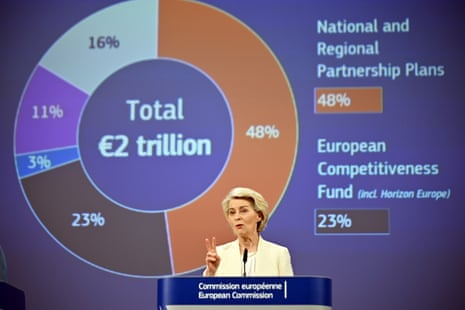
Announcing the planned EU budget for 2028 to 2034, she effectively fired the starting gun on a major and complex political fight to define the EU’s future.
“It is a €2tn budget for a new era ... that confronts Europe’s challenges, that strengthens our independence,” she told reporters at a news conference that had been delayed by several hours after her officials worked into the night haggling over numbers.
She said the proposals would increase EU funds for defence fivefold, triple funds for migration and border management and double the research budget with 35% ringfenced for climate and biodiversity.
There is also a €100bn fund for Ukraine, described by the EU budget commissioner Piotr Serafin as “our most strategic partner”.
Von der Leyen calls for new EU taxes on big firms in €2tn budget proposalRead more
15.19 BST
Jakub Krupa
Elsewhere, let’s get up on the speed on the next EU budget, announced yesterday.
Let’s start with a general view of what was announced yesterday – we covered large parts of it on the blog – and then the first reactions.
Over to Jennifer Rankin in Brussels.
14.26 BST
Separately, the New York Post newspaper has published a long interview with Ukraine’s Zelenskyy, in which he says that he talked with US president Donald Trump about a “mega deal” involving battlefield-tested Ukrainian drones and US weapons.
Zelenskyy argued that the US needed to step up its drone readiness learning from Ukraine’s experiences acquired during the fight against the Russian invasion.
Operation Spiderweb: a visual guide to Ukraine’s destruction of Russian aircraftRead more
“The people of America need this technology, and you need to have it in your arsenal,” he said.
“I think this is really a mega deal, a win-win, as they say,” he added.
He also said that similar talks about sharing Ukrainian experiences were on-going with some European partners, including Denmark, Norway, and Germany.
14.04 BST
And in the last few minutes, Andrii Sybiha has been retained by parliament as Ukraine’s foreign minister.
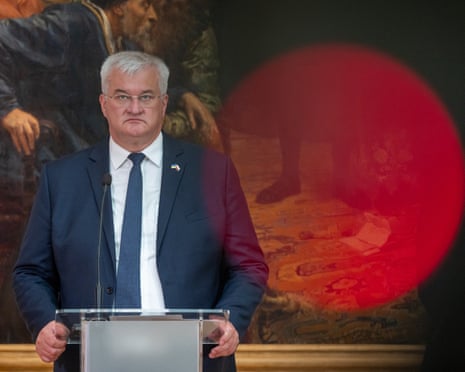
Speaking at a press conference in Lublin yesterday, he joked that he arrived for the visit as a minister, but by the time he attended the press conference he was only an acting minister.
He’s now back to his properly official title.
13.58 BST
Speaking in the Ukrainian parliament before today’s votes, president Volodymyr Zelenskyy argued that the country “needs more of its own strength” with a fast-tracked reform of and investment into Ukrainian defence industry.
“Currently about 40% of all weapons in the hands of our soldiers are made in Ukraine. In six months, it should be no less than 50%,” he said.
He said there would also be a push audit existing procurement contracts and to attract more international cooperation on defence projects including “new agreements with the US”, without offering further detail.
He also said the government will continue to pursue “a fair end to the war and guarantee real security for Ukraine.”
13.47 BST
New Ukrainian government approved by parliament - snap analysis
Luke Harding, Artem Mazhulin in Kyiv
The new Ukrainian government led by Yulia Svyrydenko has just been approved by the country’s parliament.
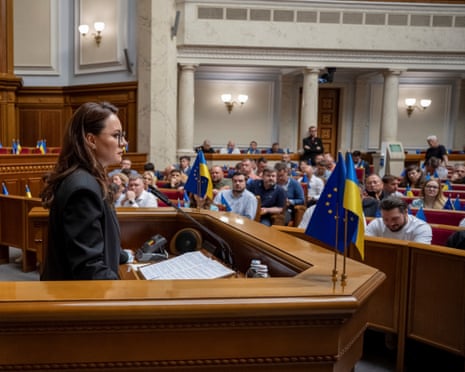
The reshuffle has been heavily trailed and it’s all about a fresh start at a time when, on the international level, things certainly look better for Ukraine than they did back in February, when Volodymyr Zelenskyy visited Donald Trump in the Oval Office.
What is slightly surprising is the nomination of deputy prime minister for Euro-Atlantic integration, Olha Stefanishyna, as the new Ukrainian ambassador to the US.
It seemed pretty clear that Rustem Umerov, the defence minister, was going to get that post.
Opposition MP Oleksii Honachrenko claimed that the decision to appoint Stefanishyna was made at the very last minute, calling the situation “a mess”.
Stefanishyna has had the Euro-Atlantic portfolio for five years, so she is a very competent and experienced person, but it’s worth keeping an eye on what job Umerov will get in the new administration instead.
13.13 BST
US tells Switzerland its order of Patriots will be delayed as Ukraine gets priority
Meanwhile, the Swiss defence ministry has just said that it was informed by the US Department of State that its deliveries of Patriot missile systems will be delayed as a result of its decision to reprioritise deliveries to Ukraine.
The Swiss statement says that its five Patriot systems, ordered in 2022, were meant to be delivered between 2027 and 2028, but the US announcement means that they will be “affected by the new prioritisation” and delayed further.
“It is currently unclear how many systems will be affected and whether the delivery of guided missiles will also be affected. No statement can be made at this stage regarding the exact timing and any further implications for Switzerland. Clarifications are ongoing,” the statement added.

Jakub Krupa

Jennifer Rankin
© 2025 Guardian News & Media Limited or its affiliated companies. All rights reserved. (dcr)
